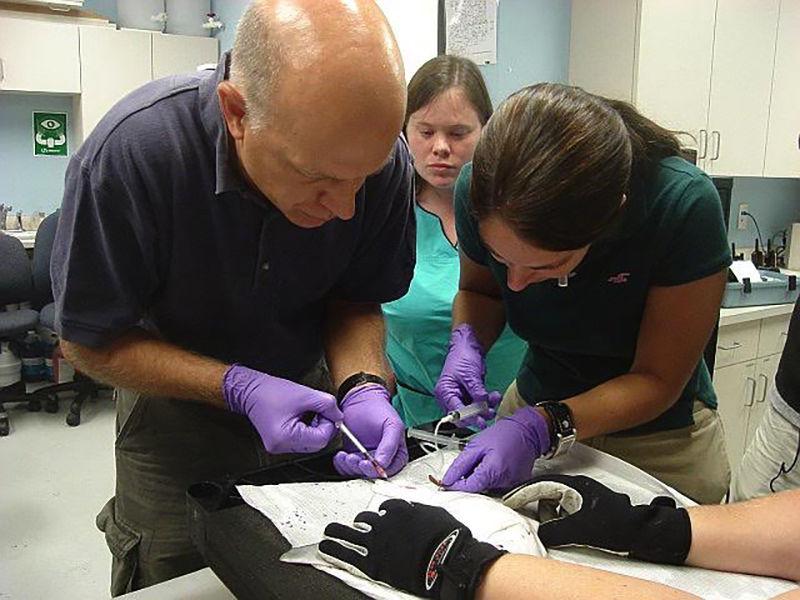From a young age, marine health specialist Craig Harms was fascinated by wildlife. Watching his dad hunt and fish and being a part of an outdoorsy family helped shape Harms in to a well-respected researcher, veterinary provider and animal health specialist for wild and aquatic species.
Since its founding in 1997, NC State’s Center for Marine Sciences and Technology (CMAST) has worked hard to research, educate and provide services for aquatic animals. The 52,000-square foot marine sciences lab is located near the Bogue Sound in Morehead City, North Carolina. Harms nurses aquatic animals back to health as the director of the Marine Health program at CMAST.
“We are NC State’s presence at the coast,” Harms said. “We have several different components. We have traditional marine sciences including fishery, oceanography, physical and mathematical sciences, as well as the College of Sciences and College of Veterinary Medicine.”
Harms serves as a professor of aquatic medicine in the Department of Clinical Sciences. Harms also provides veterinary services at a wide network of entities, such as the Karen Beasley Sea Turtle Rescue and Rehabilitation Center and NC Aquariums.
“One of the biggest projects I’ve been working on is writing a book on sea turtle health and rehabilitation,” Harms said. “CMAST is wrapping up a drug study of a pain-relieving drug in sea turtles. It’s a fairly specific study that will help us manage sea turtles when they come into rehabilitation. It tells us little about how they will respond to environmental exposures.”
In addition to a focus on aquatic animal health and rehabilitation, Harms works with other scientists to help improve animal handling and minimize research impact.
“It’s hard to do anything in this line of work without an impact, but we try to minimize impact,” Harms said.
In spring 2017, undergraduate students will be able to spend a semester at CMAST, where a variety of marine courses will be offered. This opportunity allows students to study on the water with top researchers and graduate students.
Harms’ routine changes daily, as the aquatic researcher has multiple projects underway. He is currently working on determining the effects of dredging on sea turtles, as there have been recent sea turtle deaths due to dredges.
“One of the most gratifying things to see is when we nurse turtles back to health, and also teaching veterinary students and seeing their lights go off,” Harms said. “Most of my teaching focuses on veterinary students and residents who are seeking advanced training in aquatic animals.”
Professor Jeffery Buckel works in the Department of Applied Ecology at the CMAST. Buckel works extensively in the fishery laboratory to ensure that the best data are used to manage stocks and determine how many fish can be taken without damaging the population, along with estimating vital rates.
Buckel notes that Harms’ work has been beneficial not only to the Department of Marine Health, but to the other departments at CMAST as well.
“He does lots of different things,” Buckel said. “For example, if there is a stranded or dead dolphin washed up on the beach, he helps determine the cause of death. He also works with local aquariums to make sure the animals are healthy. He’s a big help for us. He’s trained us on how to do fish surgeries correctly.”
According to Buckel, Harms also helps the recovery process when sea turtles are washed up on the shore.
Some of Harms’ most recent work includes euthanizing larger marine animals that have been stranded on the beach and are left to die. Euthanizing these animals ensures that the animals do not suffer before their death.
“He’s in here all hours of the day and weekends, too,” Buckel said. “He’s a very intelligent guy and an incredibly hard worker. He’s always at it.”













